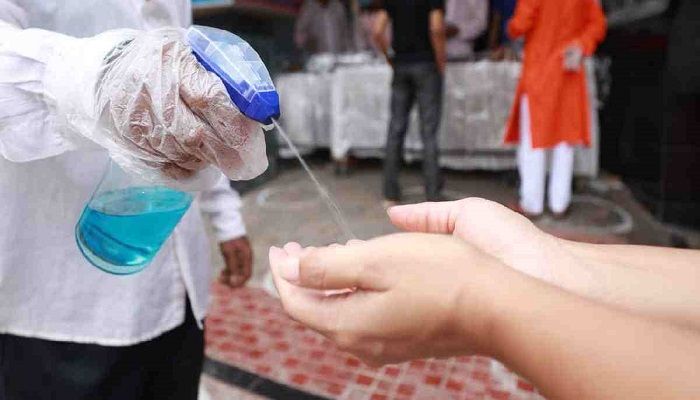
Desk Report
Publish: 11 May 2020, 11:05 am

Photo: Collected from UNB
As the government is now focusing on detecting those showing symptoms of Covid-19 to isolate them from others amid limited testing capacity in the country, health experts think silent spreaders have become a bigger threat to the efforts to stop the virus.
They also feared that the corona-infected people with no visible symptoms are going to be the drivers of spread in communities by freely roaming around, badly fueling the pandemic since the government is easing the shutdown gradually despite the spike in coronavirus cases.
Under the circumstances, the experts said people must follow WHO’s guidelines such as wearing masks, gloves, use of sanitizers, maintain good hygiene by washing hands frequently to remain safe and check the transmission of the virus.
According to a study published in Journal Science indicates that people with no or mild symptoms contributed to 79 percent of all transmissions within China, as they felt they were healthy enough to travel.
A study based in Italy similarly identified between 50 and 75 percent of carriers were asymptomatic.
The Indian Council of Medical Research (ICMR) also said 80 percent of the Covid-19 cases are either asymptomatic or with mild symptoms, but no such study has been conducted in Bangladesh so far.
Dr Be-Nazir Ahmed, former director (disease control) of the DGHS, said asymptomatic transmission is a major factor in transmission for coronavirus. ''We don't know the exact percentage of the silent spreaders in the country as we don’t have any research. But we’re certain that asymptomatic corona patients are drivers of rapid spread in the community like any other part of the world."
He said the main strategy to prevent virus transmission by asymptomatic patients is to strictly enforce shutdown, maintain isolation, social distancing, and health hygiene by washing hands frequently.
''As the government is now allowing resumption of economic and religious activities, people without serious symptoms will become 'super spreaders' of the virus,'' the health expert warned.
He said the government should take some preparations before lifting shutdown. ''If we lift the shutdown in an unplanned way, we’ll have to pay a heavy price, and will lose control over the situation, mainly because of a high number of asymptomatic patients.''
Dr Be-Nazir said the testing capacity should be raised to at least 20,000 per day to quickly identify the hidden carriers and separate them from others. ''We need good plans and management to tackle the current situation and ensure the optimum use of our limited resources and manpower.''
He said doctors and nurses should undergo the test after every 15 days to detect the asymptomatic infection among them. ''Or else, they’ll continue to spread the virus to their colleagues and patients unknowingly.''
Prof Dr Mohammed Atiqur Rahman, treasurer of Bangabandhu Sheikh Mujib Medical University (BSMMU) and a medicine specialist, said there are huge asymptomatic patients in Bangladesh like India and other countries in the world. ''Though we’ve no research finding, we can assume nearly 70 percent of people who get infected with the virus here are asymptomatic or with mild symptoms, and most of them remain undetected.''
He said detecting the silent corona carriers and send them to isolation is now the main challenge for the government. ''There're two ways to deal with the asymptomatic patients and stop transmission of the virus by asymptomatic patients. Strictly enforcing shutdown, keeping people at homes, maintaining social distancing and health hygiene is the best way to prevent it. The other way is to rapidly identify the infected people by enhancing testing capacity and send them to isolation.''
Dr Atiq said they are focusing on social distancing and lockdown for a longer period to contain the virus as the county has limited testing capacity.
''The government is now going to resume economic activities for the sake of livelihoods. If we use a mask, maintain social distancing as much as possible, wash hands with soap and avoid mass gatherings, we'll be able to protect us a bit from the virus,'' he observed.
The expert focused on decentralizing the COVID-19 testing facilities across the country to quickly identify the infected people and thus save others from the infection.
Prof Dr Sultana Shahana Banu, head of the virology department of the Dhaka Medical College (DMC), the rise of asymptomatic patients is weakening the country's fight against the coronavirus.
''Silent corona patients are very high all over the world, and it seems this number is much higher in our country as our people have a good immune system since they’re used to suffer influenza or cold-related problems,'' she observed.
Shahana said many people who get infected with the COVID-19 can hide it as no symptom develop among them. “Many asymptomatic patients are also unaware of their infection. That’s why our many doctors and nurses are getting infected by handing such patients.''
''Staying at home, maintaining social distancing and using masks and hand sanitizers are the main ways to overcome this problem, but we’re failing to do so, inviting a serious consequence,'' she observed.
Describing the asymptomatic patients as corona bombs, Shahana warned they will continue to explode that bombs everywhere if the lockdown is eased, putting the nation into serious danger of the pandemic.
Source: UNB
Subscribe Shampratik Deshkal Youtube Channel
© 2024 Shampratik Deshkal All Rights Reserved. Design & Developed By Root Soft Bangladesh